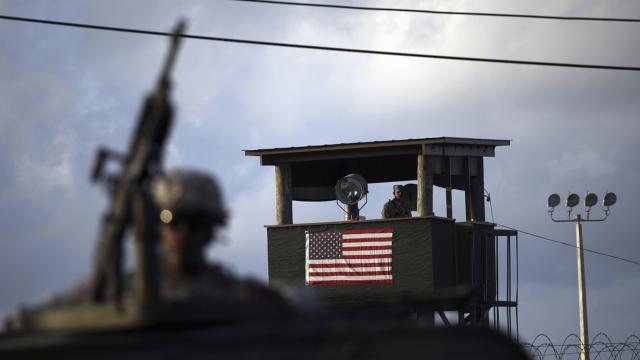
Fourteen peace activists from across the United States began a protest vigil and fast along the perimeter fence of the U.S. military detention camp at Guantánamo Bay, Cuba, on Wednesday in an attempt to draw attention to what they consider to be ongoing human rights abuses at the prison.
The protesters are all members of Witness Against Torture, a group which campaigns to have Guantánamo shut down. They plan to set up camp as close as they can to the 107 remaining detainees still being held at the facility. They will then begin a fast on Thanksgiving in symbolic solidarity with the 47 men inside the prison who have been cleared for release but are still trapped in legal limbo having never been charged with any crime, many of whom have been on hunger strike.
The group, ranging in age from 25 to 65 and drawn from across the U.S., has strong ties with the Catholic workers movement but also includes Protestants, Muslims, Jews and Buddhists. “We see Guantánamo as a radical assault on the rule of law and the alleged pillars of American democracy, and we call on the U.S. to obey the values it claims to hold dear,” said Jeremy Varon, an associate professor of history at the New School in New York and the one atheist among the group.
The action falls on the 10th anniversary of a similar protest by 25 Witness Against Torture members who, in December 2005, walked about 70 miles from Santiago de Cuba to the Guantánamo detention camp and held a four-day vigil. On that occasion, the protesters traveled to Cuba in breach of the U.S. embargo of the country, though they suffered no legal repercussions.
On this occasion, the 14 have benefited from the loosening of the U.S. travel ban with Cuba that followed the re-establishment of diplomatic relations between the two countries in July. The activists flew to the island from Miami on tourist visas.
For the past three days, they have been at an international seminar on opposing US military bases around the world, which has been held in Guantánamo province – a convenient starting point for their independent vigil at the prison about 15 miles away. The plan is to pitch tents beside the fence on the perimeter of the Cuban military zone that encircles the US military base at Guantánamo, the closest the protesters expect to get to the prison quarters themselves.
Frida Berrigan, from New London, Connecticut, who will be making her second such vigil, having been one of the original 2005 protesters, said for her, the main focus was on the 47 men cleared for release yet still stuck at Guantánamo. “Those particular men really need to be freed and returned to their own countries if they can, or if not, sent to a third country.”
She added: “We want to hold a space as physically close to them as possible, full of love and prayer and humanity. We also want to remind the American people what our state is doing in our name to these people and their families.”
President Obama promised to close Guantánamo on his first day in the White House in 2009. But his frequently repeated ambition has been frustrated through a combination of resistance among senior figures in his own administration and the intransigence of the Republican-controlled Congress.
Obama had been expected to announce this month a new strategy for closure of the prison, though the terrorist attacks in Paris appear to have deflected the plan.
The knottiest problem that needs to be fixed before the prison can be finally shut is what to do with the small number of so-called “high value” detainees, including Khalid Sheikh Mohammed, the alleged planner of the 9/11 attacks. The Obama administration has been exploring the possibility of converting a maximum-security prison in domestic U.S. territory so that military commissions – the military-led trial system established specifically for Guantánamo detainees – could be staged there.
Varon said that Witness Against Torture is not opposed to the handful of highly dangerous Guantánamo prisoners being put on trial. “We acknowledge that there are men who in all likelihood have done terrible things and should be held accountable.”
But he added that the group wanted to see an end to military commissions and their replacement by criminal procedures through the normal course of the law.
[via The Guardian]
3 WAYS TO SHOW YOUR SUPPORT
- Log in to post comments











